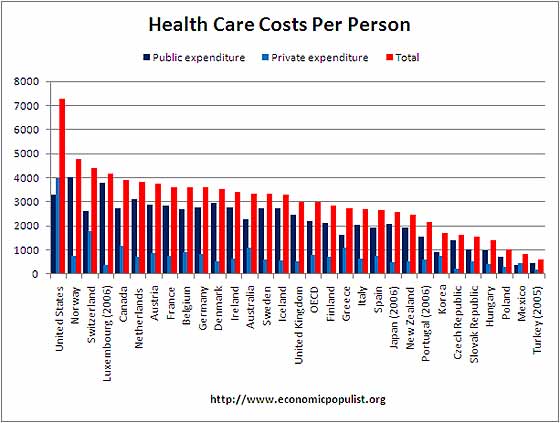Something that struck me during the run-up to congress' passage of the Obamacare bill was the focus on insurance. Sure, there was the obligatory talk about "bending the cost curve" but not a lot of action. I suppose it has to do with political constituancies.
Like education, you have a situation where the end user is often not the payer.
We had a couple of dShort's charts in "What Price Increases in the Education and Medical Rackets Look Like" and a good one in "Off-topic: When did Health Care Become a Protected Racket in the U.S.?"
Here's another, via The Economic Populist:
With the never ending pundit pontificating on the budget deficit and how we must cut spending, it seems always the bulls-eye is on the backs of the U.S. middle class, poor and national interest. Yet, even the Wall Street Journal notes health care costs are out of control. In their number of the week, they amplify the U.S. Spends 141% More on Health Care than other nations.Staying on the health beat:
Source: OECD
141%: How much more the U.S. spends on health care, per person, than the average OECD nation.141%, that's an astounding number, as illustrated by the above graph. The health care comparison report WSJ refers to is this one. The United States is the most inefficient health care system of all of the OECD countries. Regardless whether a health care system is public, private or a mix, the U.S. is plain getting ripped off and inefficient as hell to boot....MORE
At a time when politicians in Washington are battling over — among other things — the future of the U.S. health-care system, it’s instructive to see just how well that system operates. According to the Organization for Economic Cooperation and Development, we’re doing a terrible job.
Binge Drinking, Promiscuous Sex Good For You, Says New Orleans Journal Of Medicine
